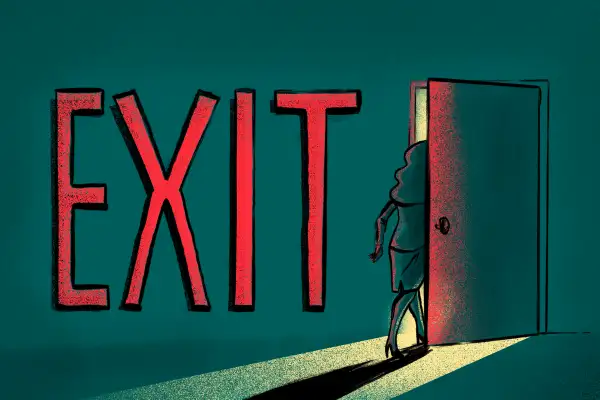10 Reasons for Leaving a Job

It used to be that quitting a job was a rare, almost taboo thing to do. After all, why would someone give up the stability and provision a great job brings to their life?
Welcome to the 2020s, where a pandemic has actually spurred something called the Great Resignation. Not only are people quitting their current jobs, but they are doing so in droves. According to CNBC, almost 48 million people quit their jobs in 2021.
Although the report cites the high demand for labor as one reason people are quitting, i.e., pursuing higher pay and better opportunities, you might still wonder when is a good time to quit a job.
In some cases, it can make sense to leave a job based on your needs and life circumstances. If you are unsure about timing this major life event, here are some good reasons to quit your job.
Top 10 good reasons to leave a job
- You’ve got a better offer
- You want to change careers
- The company you work for has limited professional development opportunities
- You want to make more money
- Your job position has changed
- Your employer is experiencing financial problems
- You want to relocate
- You want a healthier work-life balance
- You’re experiencing personal issues
- You don’t want to work anymore
1. You’ve got a better offer
What’s “better” could be different for everyone. Better for you might mean more flexibility and work-life balance. For others, it might mean a management position, full-time hours, more money and benefits or some other personal reason that creates the perfect position for you.
Ideally, you’d have another offer in hand so you don’t miss out on pay between jobs, but it’s not necessary. Many people are quitting and leaving room for a short sabbatical between employment. Either way, quitting your job for a better offer is probably one of the most common reasons to leave a job.
2. You want to change careers
If you’ve been in your current role for a long time, it’s possible to get bored after a while. People change and evolve along with their interests and temperaments. Changing personal philosophies or life goals may merit a new career change.
That’s totally acceptable and is something you should consider. Finding a career path and a new challenge you are passionate about will make your work life that much easier to handle, so it’s definitely worth seeking a new role if necessary.
3. The company you work for has limited professional development opportunities
You may have your dream job and love your career, position, and company, but you could feel stuck if there are limited opportunities for professional development or promotion. Your company may not offer these opportunities to develop new skill sets, obtain certifications, or otherwise meet your career goals, because they don’t see it as a priority or they don’t have the resources.
Either way, the outcome is the same. You don’t want to be in the same place professionally forever. This is a valid reason to start a job search, especially if you’ve always had your sights on climbing the corporate ladder, or on developing other skills.
4. You want to make more money
This is a great motivating factor for many who quit their jobs. In hot job markets, recruiters are chomping at the bit to get a hold of good candidates and pay them more than their previous employer.
If you’ve got an offer with higher pay already, it’s not a bad idea to let your current employer know the market rates for your current position and leverage it for a raise. If, at the end of the day, your job doesn’t raise your salary, it could be time to quit so you can earn more money.
5. Your job position has changed
If you’re a victim of the old job description “bait and switch,” you wouldn’t be the only one. It’s not uncommon to get hired with one list of duties, only to find out that your actual responsibilities are radically different. Even if the reason for the change wasn’t due to misrepresentation on your company’s part, a changing job description could compel you to leave.
It’s one thing if these differences are in your favor, but if your new job duties add more stress and responsibilities, it’s understandable why you’d quit. Of course, you could speak with your manager to address this concern. However, if your position still isn’t suitable for you due to changes, quitting for another job might be best.
6. Your employer is experiencing financial problems
Although it’s not always easy to get wind of your employer’s financial issues before they affect you, it’s still a perfectly good reason to leave your job. Whether you are sensing the “beginning of the end” or the company has formally announced its plans for closing, making plans for your departure as soon as possible is ideal. There’s not really much you can do in this situation because if the company doesn't exist anymore, you simply cannot continue working there.
7. You want to relocate
Gone are the days when a relocation could bring a great upheaval to your career and job options. Chances are, there are plenty of new opportunities in your location of choice.
With remote work arrangements on the rise, you’re almost sure to encounter a position that offers this as a benefit. Also, you could always ask your employer for this option before leaving. If they don’t accommodate you, you’ll probably just end up leaving to work in a place that suits your geographical preferences. After all, don’t laptops work better at the beach?
8. You want a healthier work-life balance
While it’s true that remote working opportunities have solved some of the relocation issues we mentioned above, it also brings up another issue — lack of work-life balance. Flextime, remote work and similar arrangements seem convenient at the outset but can turn into a work environment where you’re always “on.” Having access to your job’s network from home just means there’s more opportunity to keep working around the clock.
Aside from these arrangements, some company work cultures are simply too demanding and don't fit into the work-life balance that you need. If you want a position in a company with a more flexible schedule, then you should quit your job.
9. You’re experiencing personal issues
There are some seasons of life that make it difficult to maintain employment. From caring for a family member to nursing your own health issues or going through a divorce, it can be very helpful to quit your job if you cannot take an extended period of time off.
If you are fortunate enough that you can quit your job to deal with personal issues, you definitely should. An alternative to quitting may be to ask for an extended period of unpaid leave, but if that isn’t an option, then you may have to quit your job to deal with your personal issues.
10. You need a professional break
This is totally a thing, and it happens to the best of us. It’s possible that you are experiencing one or more of the issues above and the best thing you can think of right now is to take a gap year or gap period. If you’ve got the financial wherewithal to support yourself during an extended period of unemployment, a career break could be a great way to get your second wind and reenter the job market with a fresh, new perspective.
The 5 worst reasons to leave a job
1. You’re about to get fired
If this is the case, it may be better to stay so that you can collect unemployment or be eligible for a severance package. These benefits are not guaranteed for every situation, but leaving your job prematurely could definitely disqualify you.
2. You don’t like your co-workers
Not getting along with your coworkers can make for a terrible job experience, but it’s not always a good reason to leave a job. A better option might be to speak to HR and your manager and see whether there are conflict management solutions that might be implemented on a company level. If it’s totally unbearable, the only option may be quitting, but it should be a last resort.
3. You don’t like your boss/management
This is a gray area for sure, but barring harassment or unsafe working conditions, you shouldn’t let a grumpy manager run you out of your job. If your supervisor’s behavior is unprofessional or toxic, make sure to keep detailed records of your interactions. If you have a strong and valid case, pushing the situation up the ladder to their immediate manager and HR can also be an option. Another possibility might be to get a transfer to another department so you don’t have to deal with an ornery boss.
4. My friends/parents/significant other doesn’t like my job
Quitting a job because of other people is usually not a good idea. They may want you to leave because they want to spend more time with you or are jealous of your success. Don’t leave your job for these reasons!
If they have valid concerns that have to do with your safety or health, hear them out. In the end, however, you should leave your job on your own terms and not because someone else doesn't like it.
5. You’re bored
Boredom can be par for the course when it comes to working. Ideally, you’d work in a career you are passionate about, but sometimes, it may not be possible. Instead of considering it a reason to leave your job, look for a new position with your current company that might be better for you.
Explaining your reasons for leaving a job
No matter why you leave your job, there may come a time when you have to explain your reason for leaving. This might be in an interview with a potential employer or in your resignation letter. Here’s how you can explain yourself in either situation:
Explaining why you want to leave in your resignation letter
A resignation letter can be simple and to the point. You don’t really need to include your “why” as much as you need to include factual information for logistical purposes. Essentially, including the date, statement of resignation and your last date of employment is enough.
You can add your reason for resigning, but it is not necessary. You don’t want to volunteer too much information so as to implicate yourself in some wrongdoing or exclude yourself from a good reference, benefits or severance pay. If you feel particularly passionate about a problem that led to your resignation, addressing it in a separate letter might be better.
Explaining why you left in a job interview
Interview questions commonly include asking about previous jobs, and why you might have left your former employer. This is a situation where you want a well-prepared statement to explain to the hiring manager why you left your job.
You can address this question by simply telling the truth.
You can mention neutral, acceptable reasons such as the lack of career growth opportunities, work-life balance or your desire to relocate. Those are all valid reasons to leave a job that a prospective employer should understand.
Don’t badmouth your previous employer, co-workers or manager. This could be perceived by future employers as a red flag that you are hard to get along with and could leave at the first sign of trouble. If those were the reasons you left your position, think of a tactful way to phrase the truth that doesn’t jeopardize your job prospects.
Reasons for Leaving a Job FAQ
When is it time to leave a job?
What is a good reason to leave a job?
How do I leave a job on good terms?
What do I put on a job application as a reason for quitting when I was fired?
Should you leave a job if you are unhappy?
The bottom line on reasons to leave a job
Leaving a job is not a decision you should take lightly. In some circumstances, it’s the best thing to do. In others — not so much.
Do your best to map out the pros and cons of staying or quitting, then make your decision and stick to it. Either way, your resolve to get through the situation is what matters. Whether you decide to leave your job or not, you should always look for a chance to make the most out of any employment situation.

